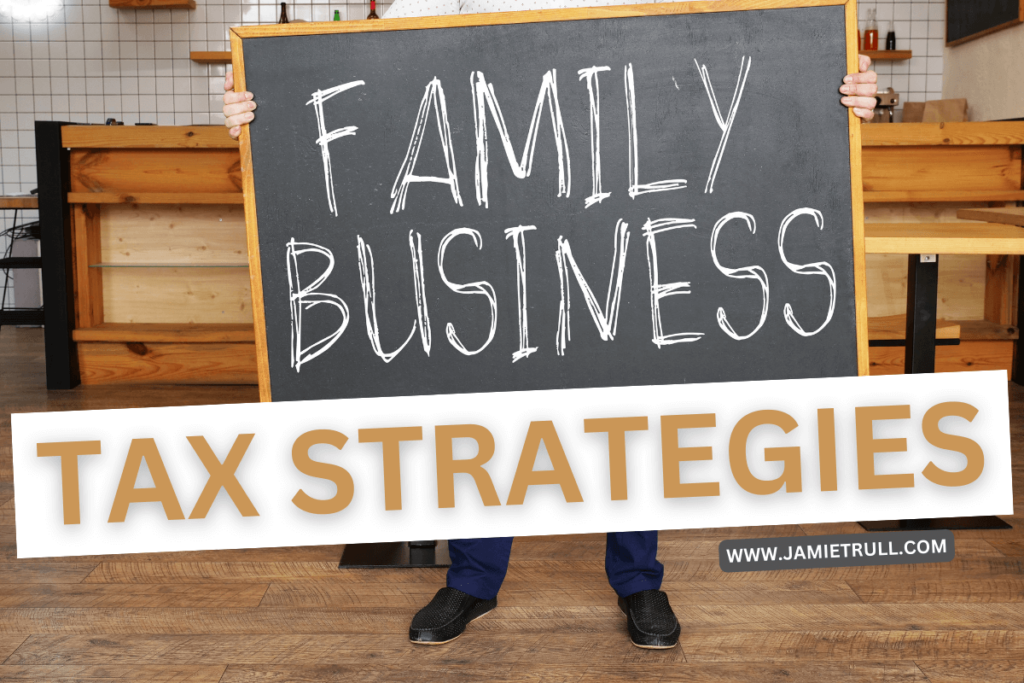
Managing your business finances often means seeking smart strategies to minimize tax burdens. One intriguing question that some business owners ask is whether adding their children as part owners in the business can reduce their tax obligations. In this post, we’ll walk through Jamie Trull’s expert insights on this strategy, break down how it works, explore the IRS rules (such as the kiddie tax), and offer an alternative way to save on taxes by hiring your kids.
If you’re eager to dive deeper, Jamie offers Kids on Payroll Masterclass—where she explains this strategy in depth. Get access to it here: jamietrull.com/masterclass.
Can You Really Save Taxes by Making Your Kids Business Owners?
Some business owners assume that adding their children as co-owners could reduce their overall tax burden. The theory is simple: if the child earns a share of the business profits, the income passed to them would likely be taxed at a lower rate. After all, children tend to have fewer income sources and might fall into lower tax brackets.
However, it’s not that straightforward. The IRS has rules in place—specifically the kiddie tax—designed to prevent families from shifting income to children solely for tax savings. Let’s explore this further.
The Kiddie Tax and How It Affects Business Ownership
In 1986, the IRS introduced the Tax Reform Act to close loopholes that allowed wealthy families to avoid higher tax rates by shifting income to their children. One key provision from this act is the kiddie tax, which applies to unearned income—including profits passed on to children through business ownership.
How the Kiddie Tax Works:
- First $2,500 of unearned income is taxed at the child’s lower rate (which is often 0% if it’s under the standard deduction).
- Any unearned income above $2,500 is taxed at the parent’s tax rate, not the child’s.
This essentially eliminates most of the tax-saving benefits that business owners hope to achieve by adding children as part-owners.
Who Does the Kiddie Tax Apply To?
The kiddie tax applies to children in the following situations:
- Children under 18: Always subject to the kiddie tax rules.
- Children aged 18: If parents still support them and they don’t earn enough to cover at least 50% of their expenses.
- Full-time students between 19 and 23 years old: If parents provide more than half of their support.
Once children reach 24 years old and are financially independent, these rules no longer apply. At that point, if your child is in a lower tax bracket, you could benefit from giving them a business ownership stake—but for younger kids, it provides little to no tax savings.

Reasons to Add Your Child as a Business Owner (Beyond Taxes)
While the kiddie tax rules limit tax savings, there could still be non-tax-related reasons to add children as business owners:
- Building generational wealth: Setting your children up as future business successors.
- Creating a legacy: Establishing family ownership and continuity in the business.
- Legal planning: Using ownership stakes to align with your long-term business goals.
But if tax savings are your primary reason for considering this strategy, Jamie Trull suggests there’s a better way.
A Better Alternative: Hire Your Kids
Instead of making children part-owners, hiring them as employees offers more substantial tax-saving opportunities. Jamie explains that earned income—as opposed to unearned income—can be taxed at the child’s lower rate without the kiddie tax restrictions.
Benefits of Hiring Your Kids
- Shift Income to a Lower Tax Bracket
If your child earns wages through legitimate work, the first $14,600 they make in 2024 will fall under the standard deduction, meaning it’s taxed at 0%. You can continue to pay them more, and additional wages will likely still fall into a lower tax bracket than your own. - No Payroll Taxes for Minors (If Done Right)
- Children under 18: Exempt from Social Security and Medicare taxes.
- Under 21: Exempt from federal unemployment taxes.
This means you avoid additional payroll costs as long as you comply with the rules and document their work appropriately.
- Teach Kids Valuable Skills
Hiring children gives them work experience while also helping them understand financial responsibility. Plus, they can contribute to the family business in meaningful ways—from social media content creation to administrative support. - Open a Roth IRA
With earned income, children become eligible for a Roth IRA—a powerful savings vehicle that allows them to start building wealth early. Over time, compound interest will grow the investment, potentially turning modest contributions into millions by retirement.

How to Get Started: Kids on Payroll Masterclass
To implement this strategy effectively, it’s important to follow legal and tax rules around hiring minors. Jamie offers a comprehensive Kids on Payroll Masterclass, where she covers everything you need to know, including:
- Entity-specific rules: How hiring minors differs for LLCs, S-Corps, and other entities.
- How to document work: To ensure compliance with labor laws.
- Examples of tax savings: Jamie breaks down potential savings step-by-step.
Get instant access to the masterclass here: Kids on Payroll Masterclass.
Example of Tax Savings from Hiring Kids
Here’s a quick overview of potential savings by employing your child:
- Pay your child $14,600 (standard deduction for 2024), and they pay 0% in income tax on it.
- Avoid payroll taxes: As long as they are under 18, there’s no Social Security or Medicare tax.
- Use the income strategically: The money can be used for childcare, tuition, sports fees, or other expenses you were already paying.
- Invest in a Roth IRA: Some of the earnings can go directly into their Roth IRA to build long-term wealth.
By shifting income this way, Jamie estimates you could save up to $6,000 annually in taxes.
What Can Kids Do in Your Business?
Jamie shares several ideas for jobs children of all ages can do within your business:
- Model for social media content
- Organize office files or products
- Assist with administrative work
- Help with customer engagement online
The possibilities are endless—just ensure the tasks align with their abilities and document their work properly to stay compliant. Get her free resource 101 Jobs Your Kids Can Do in Your Business when you attend the Kids on Payroll masterclass! – Register here – jamietrull.com/masterclass.
Final Thoughts: Should You Make Your Kids Owners or Hire Them?
While making your kids part-owners of your business won’t provide the tax savings you may have hoped for (thanks to the kiddie tax), hiring them as employees offers a much more effective way to reduce your tax burden. Not only will it shift income to a lower tax bracket, but it will also teach your children valuable skills and allow them to start building wealth early with tools like Roth IRAs.
If you’re ready to dive deeper and set this strategy up correctly, don’t miss Jamie’s Kids on Payroll Masterclass—your go-to resource for everything you need to hire your kids the right way: jamietrull.com/masterclass.
This is an unedited video transcript. Please excuse any grammatical errors or conversational quirks.
Will You Save on Taxes If Your Kids Are Part Owners of Your Business?
Can Your Kids as Co-Owners Save You on Taxes?
Can adding your kids as part owners in your business help you save on taxes? And how exactly does that work? That’s what we’re going to be talking about today. This strategy might sound intriguing, but we’re going to break down the pros and cons of making your child a business owner.
Hi everyone! I’m Jamie Trull, CPA and profit strategist. On this channel, I give you all the tools you need to stay informed, organized, and profitable in your business finances. So, make sure to like and subscribe. Stay until the end of the video too because I’ll share some extra tips for saving on taxes this year.
How the IRS Sees Income Transferred to Kids
You might be thinking:
“If I add my child as a part-owner, they’ll receive part of the profits—and since they’re in a lower tax bracket, won’t we save on taxes?”
That used to be true before 1986. At the time, many wealthy families added their kids as business owners or transferred investments to them to avoid high capital gains taxes.
But then came the 1986 Tax Reform Act—which introduced the kiddie tax. This law was created to close loopholes that allowed wealthy families to transfer large amounts of income to their children for tax savings.
What Is the Kiddie Tax, and How Does It Work?
The kiddie tax applies to unearned income—which includes profits earned by a child as a business owner. Here’s how it works:
- The first $2,500 of unearned income is taxed at the child’s lower tax rate. If the child’s only income is this amount, it could be taxed at 0% since it falls under the standard deduction.
- Any amount over $2,500 is taxed at the parent’s tax rate.
So, even if your child receives $20,000 in business profits, only $2,500 would be taxed at their lower rate. The rest would be taxed as if you had earned it yourself—canceling out most tax-saving benefits.
Who Is Affected by the Kiddie Tax?
Not every child is subject to the kiddie tax. Here’s who it applies to:
- Under 18 years old: The kiddie tax always applies.
- Exactly 18 years old: If they’re not earning enough income to support themselves (meaning they don’t cover at least 50% of their living expenses), the kiddie tax still applies.
- Full-time students aged 19-23: If the child is still dependent on parental support, the kiddie tax rules continue to apply.
Once a child reaches age 24 and is financially independent, the kiddie tax no longer applies. At that point, giving them business ownership could provide some tax benefits—but until then, it’s not likely to save you much on taxes.
Non-Tax Benefits of Making Kids Part Owners
Even though adding your kids as co-owners might not reduce taxes, there are other reasons you might still consider it:
- Setting up generational wealth: Prepare your children to take over the business in the future.
- Creating a legacy: Establishing family ownership ensures continuity across generations.
- Aligning with legal or succession planning goals: Giving kids ownership early could simplify estate planning.
However, if tax savings are the main reason you’re thinking about adding them as owners, there’s a better way.
A Smarter Strategy: Hire Your Kids
Instead of adding your child as a co-owner, hire them as an employee. This allows you to shift income to a lower tax bracket without triggering the kiddie tax. Since wages are considered earned income, they won’t be subject to the same rules.
Key Tax Benefits of Hiring Your Kids
- Shift Income to Lower Tax Brackets
- For 2024, the first $14,600 earned by your child can fall under the standard deduction—which means no income tax on those wages.
- Any wages above this amount will likely still fall into lower tax brackets than your own.
- Avoid Payroll Taxes for Minors
- Children under 18 are exempt from Social Security and Medicare taxes if they work for their parents’ business.
- Under 21: Exempt from federal unemployment taxes.
- Create Valuable Learning Opportunities
- Your kids gain real-world work experience that helps them build skills for the future.
- Open a Roth IRA for Your Child
- With earned income, you can open a Roth IRA on behalf of your child. Investing early gives them the benefit of compound interest over time, potentially turning small contributions into significant wealth.
How to Hire Your Kids the Right Way
Hiring your children isn’t just about giving them tasks; you need to follow certain rules:
- Document their work: Make sure they are doing real jobs appropriate for their age.
- Set appropriate wages: Pay a fair amount for the work they do—don’t overpay just to shift income.
- Follow federal and state labor laws: Ensure their tasks align with legal guidelines for child workers.
If you want to implement this strategy properly, check out Jamie’s Kids on Payroll Masterclass. It walks you through the legal steps, documentation requirements, and tax strategies specific to your business entity:
➡️ Enroll in the Kids on Payroll Masterclass
Example: How Hiring Your Kids Saves You Money
Here’s a quick breakdown of potential savings:
- Wages paid: $14,600 (no income tax)
- Payroll taxes: $0 (exempt if under 18)
- Use of income: Pay for sports fees, childcare, or tuition—expenses you already cover.
By hiring your child and shifting $14,600 to them, you could save around $6,000 annually in taxes. You also have the flexibility to reinvest some of that money into a Roth IRA for long-term savings.
What Jobs Can Kids Do in Your Business?
Need ideas for tasks your kids can help with? Here are a few examples:
- Create social media content
- Help with administrative tasks
- Model for product photos
- Organize files or office space
There are many creative ways your children can contribute, no matter their age. Just ensure the work is appropriate and documented.
Conclusion: Hire, Don’t Add as Owners
While making your kids part-owners of your business won’t save you much on taxes due to the kiddie tax, hiring them as employees is a much better strategy. It shifts income into a lower tax bracket, avoids payroll taxes, and provides a foundation for financial education and wealth building.
If you’re ready to hire your kids the right way and maximize tax savings, enroll in Jamie’s Kids on Payroll Masterclass:
➡️ jamietrull.com/masterclass